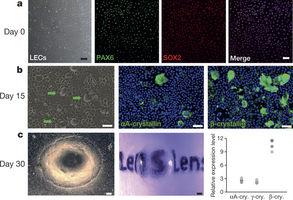This article is more than 1 year old
Chinese boffins grow new eye lenses using stem cells
A dozen kids have seen the light after a trial hailed as step towards regenerative medicine
Chinese scientists have used stem cells to regrow eye lenses and implanted the results in a dozen children.
The pioneering procedure developed at Sun Yat-sen University and the University of California means hope for some of the 20 million cataract suffers estimated to constitute half of all cases of blindness and a third of visual impairment around the world – most notably in adults in Africa and South America.
Patients can presently receive artificial intra-ocular lenses to replace degraded lens that no longer focus light on the retina.
Operation success rates are high, at about 90 per cent, with minimal complications.
Haotian Lin led a team of more than 25 researchers in the paper "Co-ordinated ocular development from human iPS cells and recovery of corneal function" published by Nature.
The authors describe the required surgery as non-destructive to the eye's outer lens and as "regenerative medicine".
"The repair and regeneration of tissues using endogenous stem cells represents an ultimate goal in regenerative medicine," the team says.
"To our knowledge, human lens regeneration has not yet been demonstrated.
"Currently, the only treatment for cataracts, the leading cause of blindness worldwide, is to extract the cataractous lens and implant an artificial intra-ocular lens. However, this procedure poses notable risks of complications."
The work isolates lens epithelial stem or progenitor cells and preserves them in a surgical method that allows cataracts to be extracted.

Rabbit lenses.
It has been successfully applied to 12 infant children following trials on rabbits and macaques.
"Our approach demonstrates a novel treatment strategy for cataracts and provides a new paradigm for tissue regeneration using endogenous stem cells," the team says.
Researcher Kang Zhang told the BBC the surgery had a lower complication rate by "almost every measure", noting that further trials are required. ®
